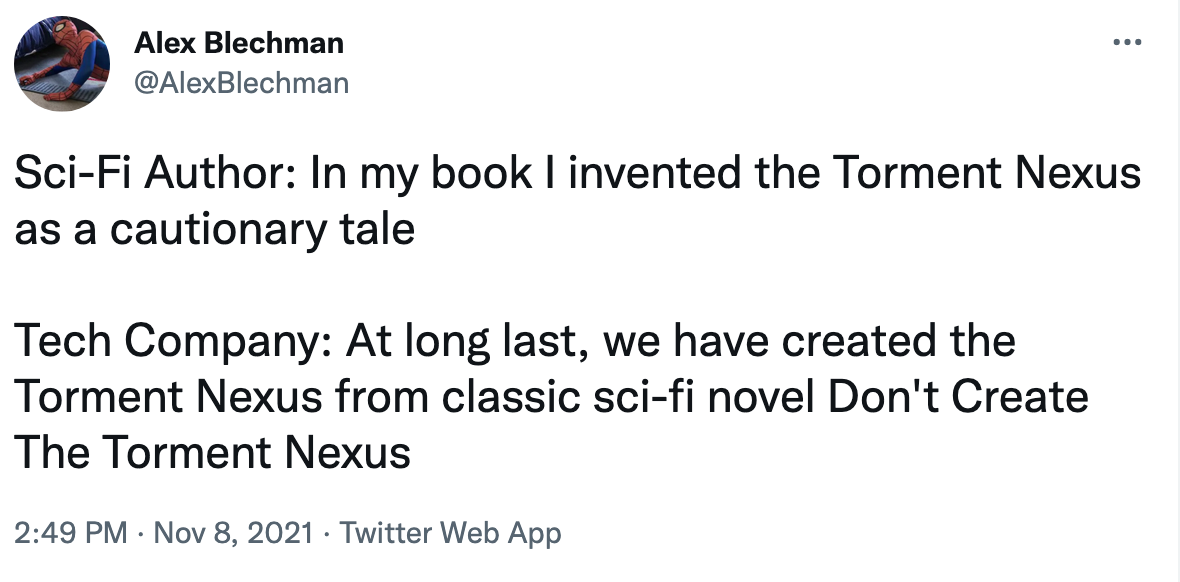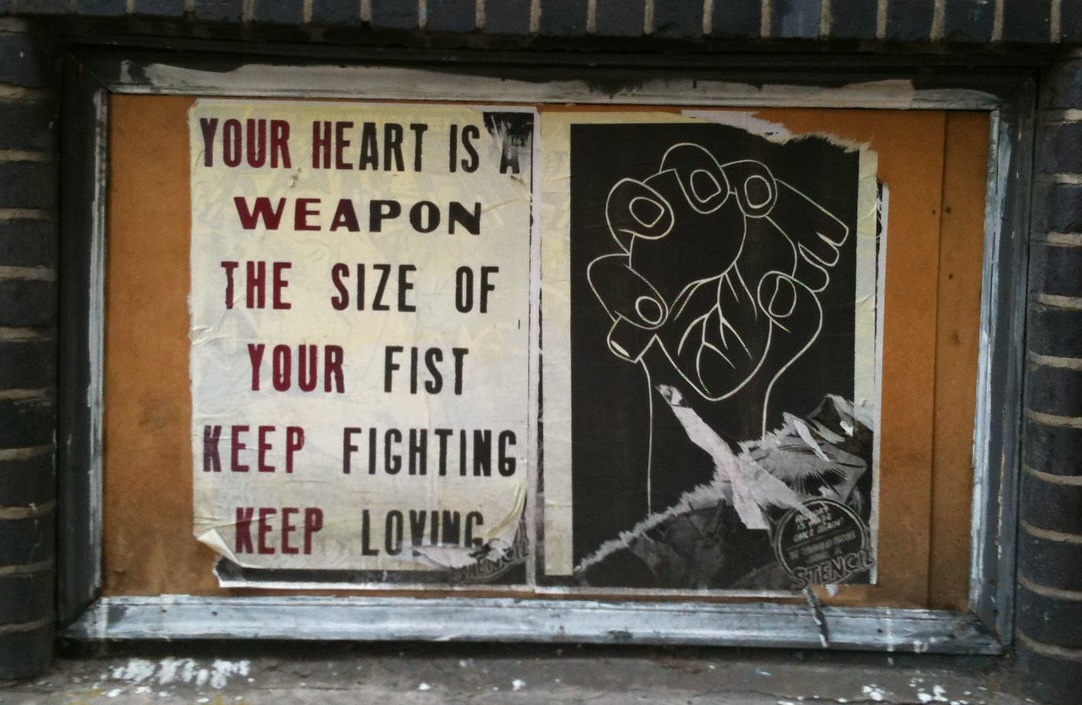How I Almost Built The Torment Nexus

Like a lot of people, I was laid off at the start of COVID. It was the worst health and economic crisis of my lifetime (so far!), and after a couple of months out of work, the panic set in. I had bills to pay, a family to feed, and no clear end in sight.
So I did something I’m not proud of: I applied for an Engineering Manager job at Pornhub.
That flies in the face of one of my core tests for any job: would I be proud to describe what I do? It still bothers me that I swallowed my integrity that quickly. Obviously I didn’t get the job (I’m guessing they noped out when they saw “Bachelor of Christian Theology” listed amongst my qualifications), but I also didn’t walk away from that moment unchanged. I had crossed my own line, and it forced me to think a lot harder about where that line actually is.
It wasn’t my first time building something I didn’t believe in. Early in my career, I worked in ad agencies with client lists that were a mix of inspiring brands and… not-so-inspiring ones. Sometimes I was tasked with creating products I’d never use or services I didn’t trust, simply because the client was paying for it. Years later I was working at adidas during the height of Kanye West’s increasingly hateful, racist behavior and his very public buddying up to President Trump. I happened to be leading a Yeezy sneaker campaign at the time and boy howdy did that make me feel like ass. It wasn’t the direct reason I left adidas, but it was definitely a factor that made walking away easier when I started debating my future there.
The Foundation You Build On
We don’t always get to choose perfect work under perfect circumstances but we do get to decide what we’re willing to attach our name to. The ethos of a company, its values, its real purpose, and the impact it has on the world isn’t just branding fluff. It’s the foundation you build on as a leader. If you can’t stand behind it, your team will feel it, even if you never say a word.
Sometimes the misalignment is obvious, like applying for a role you know, deep down, you couldn’t tell your grandmother about without changing the subject halfway through. Other times, it sneaks up on you. You join a company because you believe in what they are building, but over time the ground shifts under your feet. The mission statement doesn’t change, but how it’s lived out starts to feel different. Corners get cut. Priorities tilt toward whatever closes the next deal. Conversations about customers turn into conversations about “market capture” and “lifetime value.” You notice that the why behind decisions gets harder to find.
If you’ve been in leadership for more than ten seconds you’ve maybe already felt this creeping drift. The ethos isn’t gone, it is just bending quietly in ways that are easy to rationalize.
Some early warning signs I’ve learned to watch for:
- Values get reinterpreted to fit short-term wins (“We value transparency… except for this quarter’s roadmap”).
- Customers stop being people and start being numbers (“Churn reduction” instead of “Why are they leaving?”).
- Known harm gets waved through because “the client really really wants it” or “we’ll fix it in the next version.”
- The “why” disappears, or is replaced with something that sounds more like a sales pitch than a truth.
When those signs start piling up, you’re no longer just building a product. You’re building the Torment Nexus, whether you meant to or not. Like a frog in a pot of heating water (except the water’s a quarterly roadmap and you’re the frog) you might not notice until you’re fully poached.
That doesn’t mean you’re stuck forever.
The Ethos Test
When I’m figuring out if I can actually get behind where the company’s headed, I boil it down to a few simple questions. Nothing fancy, but they cut through a lot of the noise:
Would I explain this to my family with pride?
If I’d dodge the details at the dinner table, that’s a red flag.Does it make customers’ lives better, safer, or easier?
“Letting people #engage with their favourite #brand” isn’t the same thing.If my name was on it forever, would I still be okay with that?
Imagine your resume is a permanent museum exhibit. Is this project in the “career highlights” wing or the “bad decisions” basement?Would I be proud to talk about it in a job interview five years from now?
Future me is a lot less forgiving than panicked, job-hunting me.
If I can’t answer “yes” to all of these, I need to decide whether to push back, find another path, or walk away entirely. Once you compromise on ethos, it’s way the fuck harder to get it back.
(As an aside, my job at 1Password nails a solid 4/4 here. If you want to work somewhere that actually gives a damn about keeping your stuff safe and private, why not join us?)
When You Realize You’re Building the Torment Nexus
Sometimes you take a job and only later realize the product you’re helping build isn’t something you believe in anymore. Maybe it shifted gradually. Maybe you didn’t ask the right questions before you signed on. Either way, you’ve ended up at TormentNexusCorp™ and now you’ve got a decision to make: what’s your next move?
Here is what I try to do when I feel that creeping misalignment:
- Name it early. Don’t wait until you’re staring at a launch date. Call out your concerns as soon as you see the problem, and be specific.
- Talk to decision-makers. Share your perspective, not as a moral lecture, but as a leader who’s worried about the long-term consequences for customers, reputation, and retention.
- Keep receipts. It’s a lot harder for people to claim “no one raised this” if you have a paper trail.
- Offer alternatives. Don’t just say “I don’t think we should do this.” Coming to the table with “we should do this instead” is infinitely more powerful.
- Decide where your line is. If the direction doesn’t change, you have to choose whether you can stay in good faith. Sometimes that means leaving before the thing ships with your name attached to it.
You Always Have the Final Word

I can lead through ambiguity. I can lead through hard times. I can lead when the path forward is messy, uncertain, or full of tradeoffs.
What I can’t do is lead a team to build something I don’t believe in.
If you’re in leadership, your team watches what you say and what you don’t say. They’ll take your silence not just as agreement but as endorsement. If you build the Torment Nexus quietly, they’ll believe it’s the kind of thing you’d build loudly.
I love the phrase in the street art photo above and I think about it often. Your voice is just as much a weapon and you get to choose how you use it. Speaking up isn’t just about protecting your own integrity. It’s about giving your team permission to do the same.
So ask yourself: If your name was on it forever, would you still be proud to say you helped make it? If the answer’s no, that’s your signal. Don’t wait until you’ve swallowed your integrity to figure out where your line is.
Postscript:
This post was inspired by Mike Montiero’s email newsletter entry this week, How To Not Build The Torment Nexus. It’s really really good, he’s a much better writer than I am, you should read it.